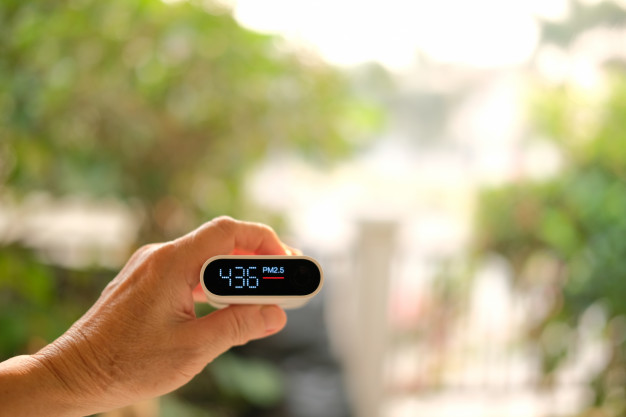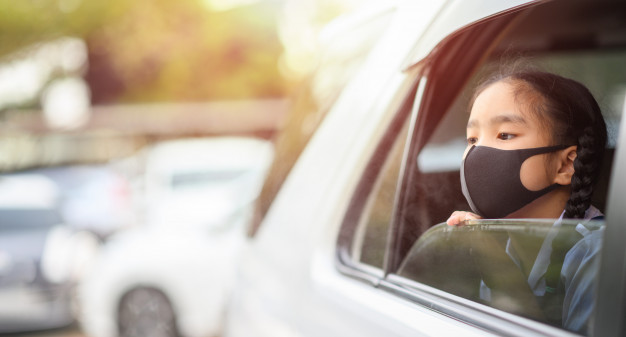PM2.5로부터 안전을 지키는 방법

최근 태국의 날씨는 높은 수준의 대기 오염으로 인해 문제를 일으키고 있으며, 세계 최고 수준에 속합니다. 그 결과, 하루 종일 뿌옇게 보이며, 건강에 큰 영향을 미치는 위험한 성분 중 하나는 바로 PM 2.5 먼지 입자입니다. 따라서 우리 자신과 가족을 돌보고 PM 2.5 먼지로부터 안전하게 지내기 위해 이 유형의 먼지를 이해하는 것이 중요합니다.
입자의 크기에 따라 미세입자는 두 가지 종류로 구성됩니다:
1. 굵은 입자 (PM10) - 이는 지름이 10 마이크로미터보다 작은 입자로, 사람 머리카락의 1/7 크기입니다. 이들은 꽃가루, 박테리아 또는 가정 먼지와 같은 자연적 출처에서 유래합니다.
2. 미세 입자 (PM2.5) - 이는 주로 인간 활동, 예를 들어 연소, 차량 배출 가스, 산업 공정 등으로 인해 발생하는 지름이 2.5 마이크로미터보다 작은 입자입니다. 이들은 PM10에 비해 무거운 금속의 함량이 더 높습니다.
PM 2.5는 호흡기계로 쉽게 침투할 수 있어 다양한 건강 문제를 일으키므로 위험합니다. 겨울에서 여름으로의 계절적 변화와 같은 시기에 온도 변화는 PM 2.5 축적 수준을 증가시킵니다. 세계보건기구 (WHO)의 2016년 공기질 가이드라인에 따르면, PM 2.5의 24시간 평균 농도는 세제곱미터당 25 마이크로그램을 초과해서는 안 됩니다.

PM 2.5에 의해 야기되는 일반적인 건강 문제는 다음과 같습니다:
• 눈 자극 및 과도한 눈물
• 코막힘 및 콧물
• 피부 자극
• 피로, 숨 가쁨, 가슴 답답함 및 빠른 호흡
이러한 증상은 알레르기, 천식, 호흡기 감염과 같은 기존 질환을 가진 개인이나 어린이 및 노인에게 악화됩니다.
주요 권고 사항은 PM 2.5에 대한 노출을 줄이거나 피하는 것입니다. 공기질 지수 (AQI)를 사용하여 공기질을 모니터링하여 실외 활동이 안전한지 확인할 수 있습니다. AQI가 100을 초과하거나 오렌지색 또는 빨간색으로 표시되면 공기질이 나쁘다는 신호이며, 실외 활동을 피해야 합니다.
PM 2.5에서 건강을 보호하는 방법:
• AIR4THAI와 같은 앱을 사용하여 공기질을 자주 확인하십시오.
• 특히 실외에서 오랜 시간을 보낼 경우 N95 또는 P100과 같은 미세 먼지 마스크를 착용하십시오.
• 어린이, 노약자, 임산부 또는 기존 건강 상태를 가진 사람들이 특히 실내에 머물도록 하십시오.
• 호흡 속도를 증가시키는 격렬한 실외 활동을 피하십시오.
• 흡연, 숯 태우기, 에어로졸 사용 또는 향을 피우는 것과 같은 실내 오염원 최소화하기.
• 실내 PM 2.5 수준을 줄이기 위해 효율적인 필터가 있는 공기청정기를 사용하십시오.
• 증상이 악화되면 신속히 의료 상담을 받고 PM 2.5 노출을 피하십시오.

PM 2.5 오염으로부터 안전합시다!
출처: 태국 보건부 질병관리국
아로카GO 콘텐츠 팀 번역 및 편집
Princ Hospital Suvarnabhumi
이 기사 공유
더 많은 기사
건강 관리 및 의료 관광에 대한 더 많은 인사이트를 발견하세요.

Is cycling really effective in treating osteoarthritis of the knee? Discover the techniques for strengthening your knees through cycling without surgery.
For those experiencing knee pain or suffering from osteoarthritis, physical movement can often be daunting. Many choose to stop moving for fear of further knee damage, but in reality, inactivity leads to muscle atrophy and knee stiffness. One of the most commonly recommended methods by doctors and physical therapists worldwide is cycling to treat osteoarthritis. But the question is, how can one cycle effectively for rehabilitation without worsening the joint condition? This article provides the answer.

골다공증에서 비타민 K의 중요성
골다공증은 당뇨병, 고혈압, 고지혈증과 비교될 만큼 중요한 공중 보건 문제입니다. 오랜 기간 동안 태국 인구, 특히 고령자들의 건강과 삶의 질에 심각한 위협이 되어 왔습니다. 골다공증이 있는 대부분의 고령자는 경고 증상이나 초기 징후가 없어 진단이 지연되고 조기 치료가 이루어지지 않습니다. 그 결과 이들은 손목, 척추, 고관절, 상완 등 여러 부위에서 취약성 골절의 위험이 매우 높아집니다.

테니스 엘보우: 운동선수뿐만 아니라 영향을 미치는 팔꿈치 통증
테니스 엘보(Tennis Elbow), 의학적으로 외측 상과염(Lateral Epicondylitis)이라고도 하며, 팔꿈치 바깥쪽 힘줄에 생기는 염증성 질환입니다. 이 질환은 팔, 손목, 또는 팔꿈치를 장기간 반복적으로 사용할 때 발생할 수 있으며, 컴퓨터 타자, 스마트폰 사용, 무거운 물건 들기, 또는 일상적인 가사 활동 등도 원인이 될 수 있습니다.